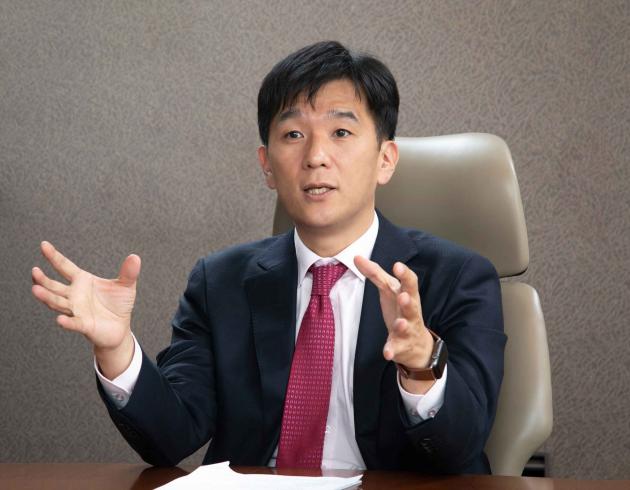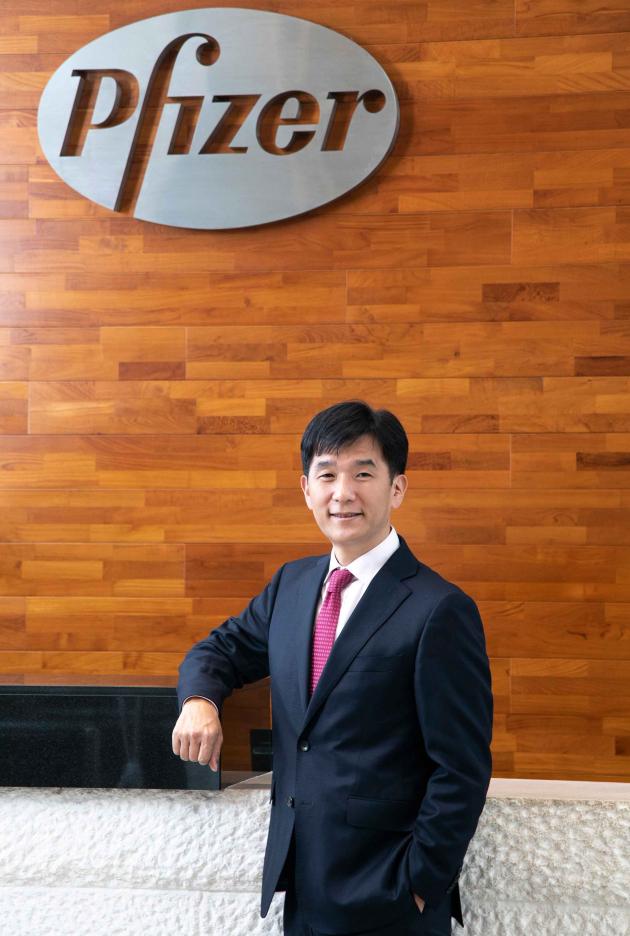Pfizer Korea has recently celebrated its 50th anniversary. Over the past half-century, the company has worked toward creating a healthy society by conducting activities centered on patients' health and happiness.
Thanks to Pfizer Korea’s efforts, the company has established itself as a global pharmaceutical company known among not only doctors but also ordinary Koreans. It has played an essential role in maintaining the top level of sales and recognition among global pharmaceutical companies that have entered the Korean market.
Pfizer Korea General Manager Oh Dong-wook, who has served for five years as the company’s CEO, has contributed to such corporate growth.
Oh still believes there is much to be done, however. To realize it, he is striving to come up with concrete measures and improve the company's first-in-class access to Korean patients while renewing his company's corporate culture.
In an interview with Korea Biomedical Review, Oh explained the company's accomplishment during the past 50 years and its short- and long-term measures in the future to continue making innovations and change the lives of patients.

Question: What are Pfizer Korea’s significant accomplishments in the past 50 years?
Answer: Throughout the entire industry, it uncommon to find a company that has a history as long as Pfizer Korea’s. I would sum up Pfizer's most significant contribution to Korean society over the past 50 years in three categories.
First, as a pharmaceutical company, we have provided innovative new drugs for patients to help them lead better lives. I believe this is the greatest pride and contribution of the company and its employees.
Second, we made various other social contributions as a responsible corporate citizen in Korea. Such efforts include the company's project to help children live with their grandparents. The campaign, which is operated with the help of Child Fund Korea and Korea Medical Women's Association, helps children so that they can pursue dreams of their own. We are conducting a "scholarship of love" initiative aided by the voluntary support of our employees to sponsor talented people who will lead Korean society.
Third, as a leading global pharmaceutical company, we have tried to deliver the company's know-how and experience to cultivate Korea's research and development and the nation’s ability to produce new drugs. The company has been working with the Ministry of Health and Welfare to help Korea accumulate know-how on drug development through various researches with local medical workers and researchers.
Representing such efforts is the R&D university program, a medical R&D education course to teach the know-how of advanced countries, and the "Pfizer Medical Award," given to researchers who have delivered outstanding results in the field of medicine.
Q: How has Pfizer Korea's position changed over the past half-century?
A: Pfizer Korea believes it has established the company as a leader in terms of sales and employees. However, we believe that supplying innovative new medicines to patients to help them live a better life is more important than sales evaluation.
I also think the company has shown leadership in various roles and contributed to creating a better healthcare environment where patients can live healthier.
Q: What are the areas and products to focus on in the future?
A: Pfizer Korea will focus on developing and commercializing innovative new drugs in six therapeutic areas -- internal medicine, inflammatory and immune diseases, anticancer drugs, rare diseases, vaccines, antibiotics, antifungal agents, and intensive care medicine.
Under the slogan of “Breakthroughs that Change Patients' Lives," the company will work to deliver innovative new drugs in the six therapeutic areas to patients more quickly, by improving the whole process of patient accessibility.
To achieve this, Pfizer intends to build a business model and environment through its corporate missions called "BOLD MOVES."
The mission carries five criteria -- unleash the power of our people, deliver first-in-class science, transform our go-to-market model, win the digital race in pharma, and lead the conversation.
As announced previously, the company plans to establish Pfizer Upjohn Korea, which will concentrate on the company's off-patent drug business.
Pfizer Upjohn Korea is responsible for providing patients with significant drug treatments in the treatment of non-infectious diseases (NCDs), including cardiovascular, pain, mental health medicine, urinary, and eye diseases.
In the future, we expect that the merger with Mylan will bring about a model that maximizes synergy.
Q: Recently, there has been a lot of interest in the separation of Pfizer Korea Upjohn and Pfizer Korea Pharmaceutical. Can you explain the separation of the company in detail?
A: While the separation is a global process, in Korea, we divided the corporation into two divisions in May, with Pfizer Korea Upjohn concentrating on the off-patent drugs and Pfizer Korea Pharmaceutical on innovative pharmaceuticals.
As the business models and strategies of the two companies are different, the business structure has been streamlined to focus on the environment, optimized strategy, and resources of each business division.
However, both companies will still operate under Pfizer. Therefore, they will have the same system and structure as before.
Q: Were there any disputes between the company and the labor union regarding the split of the company?
A: We are still discussing the specific timing and direction of the business. However, the company has seen no conflict between the management and the union in areas that can arouse such disputes, such as workforce reduction, employee compensation, and system changes. We plan to share more details at a later date.
Q: In this regard, there was a news story about the sale of Pfizer Tower recently. Will Pfizer Korea Pharmaceutical and Upjohn move to separate buildings?
A: We are not sure. However, Pfizer's headquarters property management team regularly reviews the company's options for real estate, and the sale has nothing to do with the company splitting its business.
I think it is best to think of the sale as a regular review where the global headquarters is reviewing options for investment, maintenance, and sales concerning real estate.
Q: Pfizer Korea says its goal is to bring innovative drugs to Korea as soon as possible. However, there are worries that Korea will be among the last to get innovative medicines of global pharmaceutical companies, as drug prices here are almost the lowest in the world. What is your opinion on this matter?
A: No matter how good a new drug is, it is useless if the medicine is not available on time because it is not supplied to the patient. Pfizer Korea believes that to realize its goal to "Breakthroughs that Change Patients' Live," it is vital to play a crucial role in various processes as well as to develop various innovative new drugs.
In this regard, the drug price seems to be the most prominent part. As many countries refer to Korea's drug prices, we believe that Pfizer Korea's role is to serve as a bridge between the global headquarters and the Korean government and reach a solution that can benefit both parties.
Therefore, Pfizer Korea is making many efforts and ideas to close the gap with various stakeholders in this society so that patients can live healthy and happy lives through medicines.
One good example is the recent introduction of a risk-sharing agreement (RSA) concerning reference prices.
The government and the pharmaceutical association have worked together closely to make a lot of progress in expanding the "risk-sharing," which had been limited to anticancer drugs and rare, incurable diseases.
We are also continuing to look for realistic and creative solutions and strive to achieve our corporate goal.
Q: Various multinational pharmaceutical companies have stressed that the RSA program is too focused on oncology. Does Pfizer Korea share the same view?
A: Yes. The RSA system started with oncology but is expanding to other areas through consultation with the government and other stakeholders. The company expects that the program will grow to include various diseases in the future, and the program will further improve.

Q: When you first started serving as the head of Pfizer Korea, you mentioned some personal goals, such as changing the negative views of multinational pharmaceutical companies and setting proper value recognition for new drugs. Are there any accomplishments in this area as you reach your fifth year in office?
A: This company has tried to achieve this goal in various ways, but negative prejudice cannot change quickly. As mentioned in my inauguration, we have been attempting to improve the overall branding or image of global pharmaceutical companies.
Pfizer's various social contribution activities mentioned in the beginning are good examples.
We are also trying to become a company that lives together with society as a responsible corporate citizen, aside from generating profits.
Pfizer Korea is also leading the way in terms of gender equality. At Pfizer Korea, more than half of the employees are women, and the female executives’ share is much higher than other local companies. We are also making a lot of changes and discourse to create a pleasant working environment for working moms and female employees.
At the same time, we are trying to establish a horizontal organizational culture by removing Korean job titles.
To lead Korea's R&D development capacity, Pfizer and many multinational pharmaceutical companies are conducting large-scale clinical trials in Korea.
As a result, the companies are hiring high-quality local researchers, while also training those with less experience.
I believe that our company contributed to improving the image of global pharmaceuticals through the creation of high value-added jobs, technology transfer for R&D development capability, and advanced organizational culture and organizational structure.
Through continuous efforts, we will make efforts so that the public can feel that global pharmaceutical leaders such as Pfizer are making positive contributions to Korea and not bent only on making profits.
Q: What about setting proper value recognition for new drugs?
A: We believe that strengthening health insurance coverage through the “Mooncare,” a new healthcare policy of President Moon Jae-in, is the right direction.
I think that the new policy will have a positive impact so that more patients can live healthy lives with proper care. Since patients want to use medicine to improve their quality of life, and the government needs to consider finances, it is vital to find a consensus that reflects the positions of various stakeholders.
I think it is essential to know how to allocate the available health insurance financing to the use of innovative new drugs that are reasonably meaningful and valuable. At the same time, I understand that the government is trying hard to find a reasonable spot for drug spending.
Pfizer will continue to support and improve in this area as a leading company in the pharmaceutical industry and a trusted partner with the government.
Q: Are there any additional comments that you would like to make about Pfizer Korea?
A: Pfizer Korea is a combination of Pfizer's outstanding innovation, system, and operating organization know-how with Korean's excellent competence.
Korea's economic size and the pharmaceutical market size have excellent growth potential and significant scale, even when viewed globally.
Pfizer Korea also has the excellent talent here. Today, more than 50 of the 700 Korean employees are serving at the global headquarters.
In the future, we would like to grow into an organization that contributes not only to Korea but also to the global market by making the most of Korean talents, both locally and globally.

